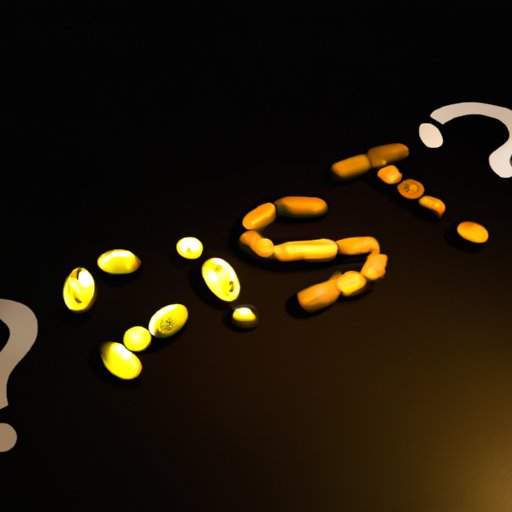
Introduction
If you’ve considered taking GABA supplements to help with anxiety, stress, or sleep, you may be wondering how much GABA you should take to get the best results without negative side effects. Gamma-Aminobutyric acid, or GABA, is a neurotransmitter that plays an essential role in the central nervous system. People take GABA supplements to promote relaxation, improve mood, and support cognitive function, among other benefits. However, as with any supplement, it’s crucial to take GABA in safe dosages to avoid potential complications.
A Beginner’s Guide to GABA Supplementation: How Much is Safe to Take?
GABA supplements come in various forms, including capsules, tablets, and powders, with varying strengths per dose. As a beginner, it’s safest to start with the lowest recommended dose and gradually increase the amount as needed. Most GABA supplements suggest a starting dose of 250-500 milligrams per day. It’s essential to read and follow the manufacturer’s instructions on the label, as the dosages may vary depending on the product’s potency and purity.
Factors that may affect individual dosages include age, weight, gender, and current health status. People with certain health conditions or taking medications that affect neurotransmitter function should consult with a healthcare provider before taking GABA supplements. It’s also crucial to avoid combining GABA with other supplements or medications that may affect brain function without consulting a healthcare provider first.
GABA is generally safe for most people when taken at recommended dosages. However, high doses of GABA may have adverse effects, such as drowsiness, fatigue, and mental fog. In rare cases, GABA overdose may cause breathing difficulty, a drop in blood pressure, and loss of consciousness.
The Science Behind GABA Dosing: Finding the Sweet Spot for Optimal Results
The biochemistry of GABA is complex, as it interacts with various receptors and other neurotransmitters in the brain. GABA regulates brain activity by inhibiting the activity of excitatory neurotransmitters, such as glutamate, that stimulate brain cells. By reducing excess brain activity, GABA promotes relaxation, reduces stress and anxiety, and improves sleep quality.
The optimal dose of GABA varies depending on the goal of supplementation. For example, to promote relaxation and reduce stress, a dose of 500-750 milligrams per day may be sufficient. For improving sleep quality, doses of 500-1000 milligrams before bed may be effective. Some studies have suggested that higher doses of GABA may be needed to support cognitive function and memory, with doses ranging from 2000-3000 milligrams per day.
Exploring the Potential Risks of Taking Too Much GABA and How to Avoid Them
As mentioned earlier, high doses of GABA may cause adverse effects, such as drowsiness, fatigue, and mental fog. However, it’s rare for GABA to cause severe complications, and most cases of GABA overdose are mild and self-limiting. Symptoms of GABA overdose may include dizziness, nausea, vomiting, and headache. GABA overdose may also interact with medications that affect the central nervous system, such as benzodiazepines, sedatives, and antipsychotics.
To avoid GABA overdose, it’s essential to stick to recommended dosages and start with the lowest effective dose. People with certain health conditions, such as liver or kidney disease, should consult with a healthcare provider before taking GABA supplements. It’s also crucial to avoid combining GABA with alcohol, as this may increase the likelihood of adverse effects.
Personalizing Your GABA Dosage: Factors to Consider Before Starting Supplementation
Before starting GABA supplementation, it’s essential to consider individual health considerations and potential interactions with other supplements or medications. People with underlying health conditions, such as pregnancy, nursing, or liver or kidney disease, should consult with a healthcare provider before taking GABA supplements. People taking medications that affect the central nervous system, such as benzodiazepines, sedatives, or antipsychotics, should also consult with a healthcare provider before taking GABA. It’s also crucial to avoid combining GABA with other supplements or medications that may affect brain function, such as caffeine or alcohol, without consulting with a healthcare provider first.
Dosage adjustments may be necessary for people with specific health conditions, such as epilepsy or bipolar disorder, as GABA may affect neurotransmitter balance. People taking GABA supplements for anxiety, stress, or sleep should monitor their symptoms closely and adjust the dosage as needed. Most people should start with the lowest effective dose and gradually increase the amount as needed while monitoring for adverse effects.
Dos and Don’ts of GABA Supplementation: What Experts Recommend
Experts generally recommend taking GABA in safe dosages, starting with the lowest effective dose and gradually increasing the amount as needed. It’s crucial to avoid exceeding the recommended dosage to avoid potential complications. GABA supplements are generally safe for most people when taken as directed, but people with underlying health conditions or taking medications that affect neurotransmitter function should consult with a healthcare provider before starting supplementation.
To maximize the efficacy of GABA supplements, it’s essential to take them consistently and as directed. It’s also crucial to avoid combining GABA with other supplements or medications that may affect brain function without consulting with a healthcare provider first. Regular exercise, a healthy diet, and stress management techniques, such as meditation or deep breathing, may also complement GABA supplementation and promote overall well-being.
Conclusion
How much GABA should you take? The answer depends on individual factors, such as age, weight, gender, and current health status, as well as the goal of supplementation. As a beginner, it’s safest to start with the lowest effective dose and gradually increase the amount as needed. High doses of GABA may have adverse effects, but most cases of GABA overdose are mild and self-limiting. It’s essential to consider individual health considerations and potential interactions with other supplements or medications before starting GABA supplementation. With safe and effective use, GABA supplements may provide a natural and non-addictive way to promote relaxation, reduce stress, and improve sleep quality.





